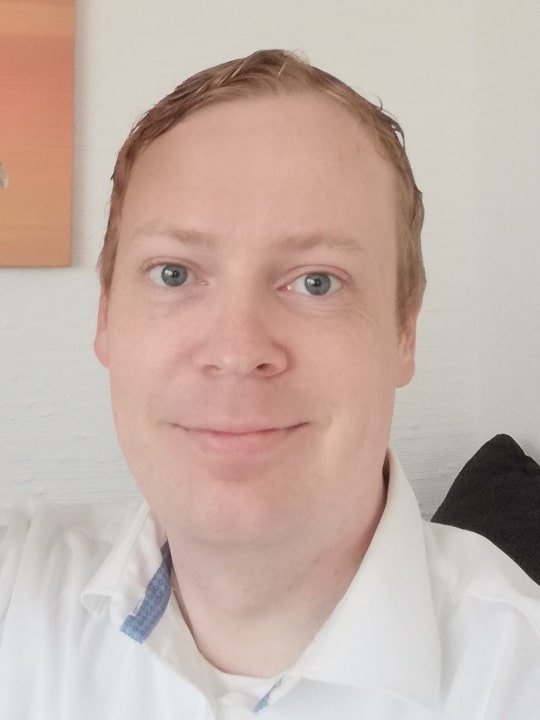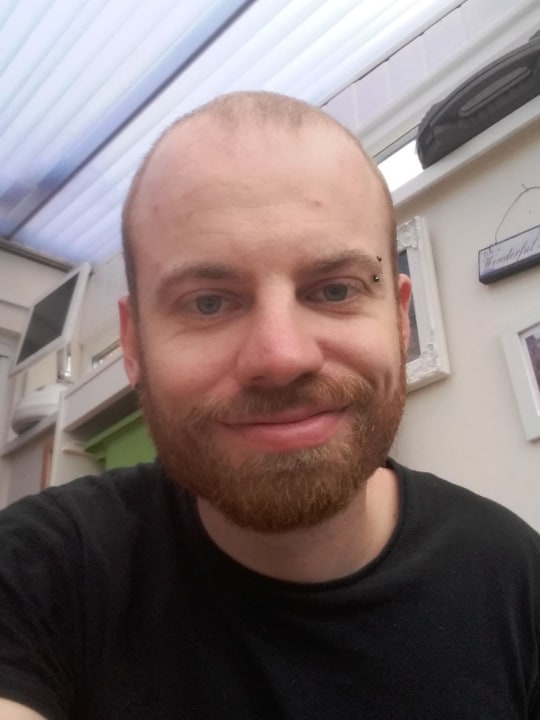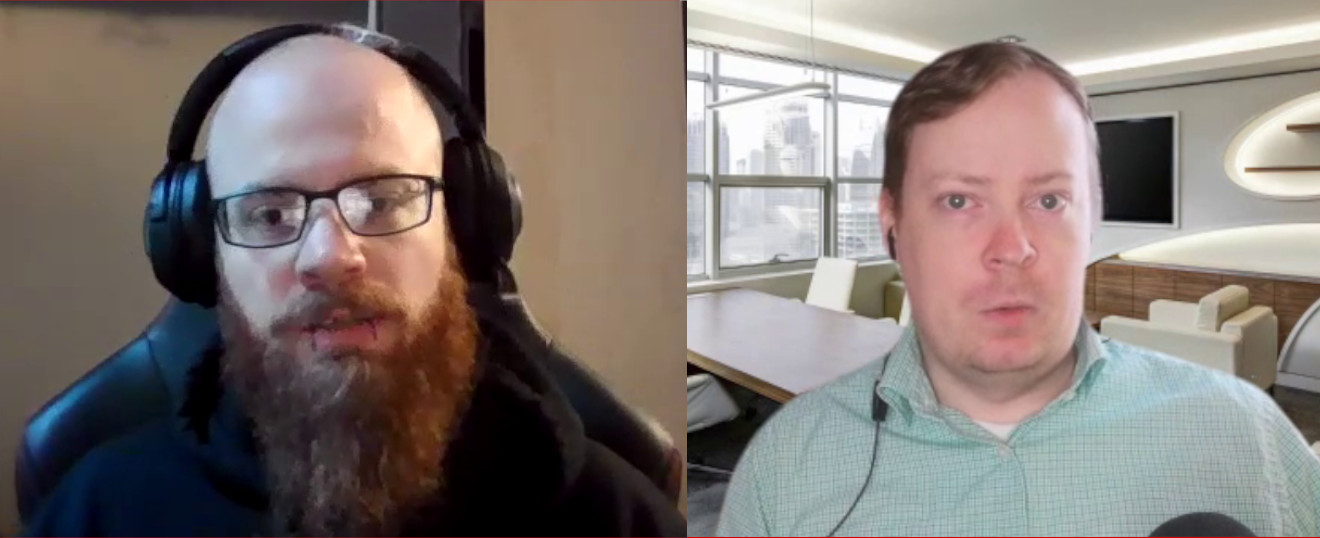In their first podcast episode Steven and William discuss their motivations for asking the age-old question 'Who am I?' and how best to go about their quest of exploring possible paths to an answer.
Watch a Short Excerpt:
Transcript (continued):
Steven: Yeah, that's a perfect segue that will probably be part of every podcast: the fact that I'll mention Dune at least once in everything, which is that the segue is that that's why a lot of people struggle with Dune, because it's so different and so outside of what we understand, or think we understand, in its environment in its universe. But once you start scratching the surface you start to see the commonalities of the human experience. That's why a lot of people read the first few chapters and just put it down because it's like "What the hell?" There's so many different words used and actions.
William: It's not just names, it's actually vocabulary.
Steven: The political structure, the vocabulary, yeah. And again it loops back into the fact that most stories, they do have a, the good ones, the great ones, have the common human experiences within them.
William: Even though people have special abilities it's not too foreign because, well, we would all like to have some special abilities. But you can still use some of your imagination to see what it's like to read people's thoughts or fly or whatever.
Steven: Again, it's the emotional experience, isn't it.
William: Yeah, you call it catharsis, right? I read once in some, maybe on your homepage, where you say that catharsis is one of the reasons you like fantasy media in general. And that's similar to the gaming experience we were just talking about: it's virtual but it's also real.
Steven: That loops back to what we said at the start, to do with (oh man I just went a memory just lost it)... That's really annoying. I had it. I had a really good...
William: Okay, another question. Maybe you'll get back to it. As an author of fantasy, do you have a certain goal for your readers?
Steven: Never.
William: Is there something rewarding for you if they manage to do something interesting by reading your books?
Steven: I never really have the readers in mind. It sounds very selfish. But it's my experience: writing the story has always just been "what would I like to read?" If ideas come into my brain I just write them in a way that if someone else had written the story I would pick it up and just be absorbed into it. And I just hope that, you know, other people enjoy them too kind of thing. That's always kind of been my... Weirdly, in the past I've been a very overthinking human being. And I still am in many ways. But when it comes to stuff like that I just do it. I just write it out and take the concepts and roll with them. It sounds really pretentious and annoying; but the story tends to kind of just write itself. I've been very fortunate with that where they just flow.
William: Stream of consciousness.
Steven: Yes. There's a lot of editing involved. Don't get me wrong. There's a lot of corrections need to be made afterwards. There's a lot of that, but they solved the initial outline. I don't necessarily think about who's going to read this or how they're going to respond. And again, maybe I should. Maybe I should be more conscious of that. There's been stuff that's happened with certain stories.
William: I mean, don't let it ruin your recipe. You know, if something's working for you.
Steven: It feels like it is. It feels like it is. It's a slow industry, so current prices are just waiting for a revamp of all my work pretty much. So, until that happens I'm pretty much just working on projects and not really doing anything in terms of promoting and marketing. But the reading experience and the catharsis, it tends to... I think I try to write them... When I write, I think a way that people can interpret it however they want. So it's ambiguous and open enough that a lot of what goes on, you can pick and choose how you respond to it, for your own perspective. Often a story it could be like "Okay, this is how it is. This is what's going to happen. This is what's good. This is what's bad. blah blah". I think a lot of what I write I think will bite, will polarize people. People will read it and be like "Okay. That's cool, blah blah, because they've seen it as that way". Or other people would be really offended or be like "This is rubbish because that's what they've projected onto it", that they've chosen to see that side of the story rather than the whole.
William: You write offensive things?
Steven: Not offensive in that like the interpretation... So we talked about the Frankenstein story earlier. In the Daria V Frankenstein I deal with equality and gender roles and those kind of topics. And again, I'll bit get it now because it's not time for that discussion. Maybe in the future. But it caused a bit of difficulty between the editors and myself, the publisher, to try and get it to where it needed to be.
William: Did you have to push for it, to happen the way you wanted?
Steven: Yeah, and I also had to be humble enough to accept that I was wrong at various points and make sure that I was keeping my mind open, again, to how readers will respond to things; just because I think that the interpretation should be one way, or I see an interpretation that I hope other people will see. This isn't gonna necessarily mean they do see it. So I have to actually learn to be a bit more specific in the plot and think about who's this after being written for and who's going to read this and actually you think about that more, because in the past, as I say, I haven't. So actually consciously thinking about it will make sure there are no obvious contradictions. Because if you're trying to do a theme, and then you end up without realizing it contradicting it through characters or through the experiences, then it can look very bad as a writer and you can look like an idiot.
William: And people love to point that out.
Steven: Yes, they do.
William: Maybe you could do something on social media to get more feedback on what your readers think about your stories. I mean, if you want to go that way. Again, don't do anything to to kill the thing that works.
Steven: As I say, this is part of a discussion, another sort of half an hour worth of waffling on my part just to, I guess, discuss that story and what happened in that story and how in terms of how it led to me, how many discussions with the editors about the content, and if you're trying to cover a certain theme. So I think that, yeah, for another time, definitely. How about you? What are your mediums for social creative outputs? You do coding and stuff.
William: Yeah. Well I haven't been creative in a while. But when I do have some leftover energy I like some programming. I, let's see, about a year ago I was trying to gather all the exercises I did as a student of computer science and it was difficult to find all the code left over in Dropbox folders, emails. And some of the software had moved on, so that it was no longer compatible. But then I thought "No. I it's fine for that to be in the past." I recovered some of it, and that was interesting. It made me a bit nostalgic for the days of studying. I wish I could be a student my whole life. So no, up till now I haven't felt the need to produce much. But now I'm starting a new phase. This is a big step for me, to do a podcast. So far I've just been soaking up everything. Some people like to call me a sponge because I just love to learn all kinds of things. And so that's been reading, and also the last few years YouTube. Since I realized "Wow, there's a lot more information out there than what television offers you".
Steven: Oh, yeah.
William: Diverse and more tailored towards what I think personally is valuable. So three years ago I developed an interest in politics, and that was never there before. So now, I guess you could say, my output is, or I have a need now to talk to people about politics. There's not a lot of opportunity for that, I mean, with people who are open even though they have a different perspectives than I do. Bt whenever I can, I mention it and and see what happens, what response I get. For example on Friday I asked my colleagues "Did any of you do anything or think about anything because it was September 11th two days ago?", and they said "Not really, just that it was on the news a bit." And I said "Yeah, well, on the alternative news channels that I watched there was quite a lot about it, but not in the sense of let's have a moment of silence, but let's go through all the evidence again that shows that the attacks in in Manhattan were not just a few people from a cave in in the Middle East but..."
Steven: There's a lot of discussion around that.
William: Yeah, and should never stop because it's still buried and suppressed; and not enough people know the truth about what actually happened. Just how many institutions and governments were involved in it. Anyway...
Steven: Well a good idea would be to next discussion politics and then a bit of my book stuff, in terms of themes, and how they relate to, I guess, how as a creator you write, you create things for yourself and for your audience. But we can discuss some political stuff together. We can discuss, you can if you want to.
William: Sure. Yeah. I described the topic, the main topic of the whole podcast on the homepage as "we're discussing questions around personal identity", because that that's what the question "Who am I?" is about. Not like "Who the heck am I?!", but rather, of all the things that people tell themselves about their identity, what applies to me? How do I feel about what I am, who I am, in relation to the world, other people, the environment.
Steven: The Greeks had it good, with all their philosophy. It was above the temple at Delphi in, I don't know, 600 BC or whatever, where the phrase "Know thyself" comes from. This constant desire to know thyself, to know who we are. Who am I? The other phrase was "Everything in moderation". Something along those lines.
William: Also by the Greeks, you mean?
Steven: Yeah. So it was at the temple of Delphi. And it was written above it: those two phrases "Know thyself". And the translation, I think, is something on the lines of "Everything in moderation" or "Nothing in excess". That sort of phrase. The "Know thyself" is one of my favorite things ever. Because all we do as humans, we just constantly try to understand who we are.
William: That's right, in many different ways: You're the artist. I guess you express, right? Would you say you express along your quest for knowledge about yourself? Yeah, I like that your goal is not to entertain people or to make money or to tell people what they should be. It's just a thing you do for you. And if it can help you support yourself financially, then that's great.
Steven: That'll be nice. Again, it's exploring. Like the podcast, the plan of the podcast is to explore just many different topics. That's what I do with my writing. One set of books is more philosophical and draws on religion in this fantasy setting. And then one set is like steampunk mixed with again the "Who am I" and the equality concept and the different perspectives around equality. And another one was just solely, I think just gonna end up, being all fantasy and not actually thinking too much about concepts, and just literally just be a crazy adventure story. So again, it's made different ways of like a podcast or like a story. All are. All are. It's the same, really. I guess a shoebox. But that's a discussion for another time.
William: I'm not so much the artist, but pieces of media that have influenced me a lot, and not made me what I am, but have resonated with me... I've also had to deal with the question "Who am I?". And that's the Matrix movies.
Steven: Yes!
William: Especially the first one. I remember how that really got to me. And science fiction in general. That's my favorite genre, because it shows that there is value in in thinking about questions that we don't ask ourselves every day. When we go shopping or working we just live, we just survive. But I think for life to be more valuable, you should explore more, deeper. And that's that's not always easy when there's no time or energy left for it. But in movies, since they're entertaining and a good source of education as well...
Steven: It has to be fun, like you talked about earlier, where it's the play thing and we learn through playing games and stuff. It has to... People, you know, switch off or get bored if a discussion is too in depth or too detailed. But if you can weave that into fun things for them, again, everyone has their own kind of fun. Because my fun sometimes IS having a massive theological discussion that lasts hours. And then other times I just want to play a board game or D&D which can explore something else or whatever. I don't know what's gonna be explored. It is always trying to be conscious of everyone else's different fun, I guess. And meaning of life, that kind of concept. Because some people do just want to drift through life. They don't actually want to explore other things. And who are we to tell them they have to? But I think there a lot of people out there who want to. That's a key thing as well, is that they want to discuss these things but, again, it's not always... They can't find the right people to discuss them with.
William: Right. Yeah. We're very isolated, and we don't realize how much we have in common. And we're not alone at all. But it takes some risk to speak to someone and just open up about things that can be very private, can be hurtful to share. But it could be very rewarding if it works out, so.
Steven: The honesty behind it, it's hard. The trust, trust and honesty. That's what we have. I think that's pretty much what we have. We have a trust and an honesty, where we can just discuss things, life and fun things, and things that we enjoy.
Other Episodes:
Ep. 51: How Conditioned Are We ?
How much of what you do, think and feel comes from intentional, free chosing? How much of your actions and decisions are pre-programmed? You are the product of your upbringing, culture and genetics. What is out of our control? What can we influence? How can we counteract our predestination?
Ep. 50: What Am I Responsible For ?
Are you taking too little responsibility for your actions, or perhaps too much? How much are you able to understand or determine the consequences of your decisions? Are you in control of anything? Is free will an illusion? Can you do something to improve your thoughts, feelings and relationships with...
Ep. 49: Empathy Can Be A Super Power
Everyone has the choice of either living isolated from other people and their own feelings on the one hand, or to connect with others and their own emotional core. The road towards connectedness involves vulberability and weakness. But it leads to a very rewarding ability that includes deeper understanding of...
Ep. 48: Why Am I Ashamed?
What secrets do you have? What facts about you must never become known to others? What happens in our childhood that implants beliefs in us that hide away for the rest of our life? Can we uncover them deliberately? Can we regain the emotional freedom and levity that playing children...







